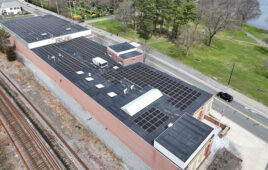
Cypress Creek Renewables
Governor Roy Cooper today issued Executive Order No. 246, affirming North Carolina’s commitment to a clean energy economy and directing next steps in the state’s plan to achieve net-zero greenhouse gas emissions and create economic opportunities for North Carolinians across the state, especially in underserved communities.
“Transforming North Carolina toward a clean energy and more equitable economy will provide good jobs and a healthy environment for generations of families across our state. To achieve our goals we must be clear, intentional and determined,” said Governor Cooper. “We’ve made monumental progress by developing a clean energy plan tailored to our state’s unique challenges and opportunities and passing into law required carbon reduction goals for utility providers. This order will assess our progress reducing climate pollution, and direct ways to curb environmental injustices, increase clean transportation options, and build more resilient communities in North Carolina.”
Executive Order No. 246 updates North Carolina’s economy-wide carbon reduction emissions goals to align with climate science, reduce pollution, create good jobs and protect communities. The Order strengthens North Carolina’s commitment to reducing greenhouse gas emissions, increasing the statewide goal to a 50% reduction from 2005 levels by 2030 and achieving net-zero greenhouse gas emissions as soon as possible, no later than 2050. To meet these goals, the Order directs the Governor’s administration to update a statewide greenhouse gas inventory to measure current levels of greenhouse gas emissions, as well as analyze potential pathways for achieving net-zero greenhouse gas emissions by 2050.
Executive Order No. 246 also takes steps to encourage and prepare for North Carolina’s transition to a clean transportation future. The Order calls for an increase in registered zero-emission vehicles (ZEVs) to at least 1,250,000 by 2030 and for 50% of sales of new vehicles in North Carolina to be zero-emission by 2030. It also directs the North Carolina Department of Transportation to develop a North Carolina Clean Transportation Plan for decarbonizing the transportation sector through reductions in vehicle miles traveled, an increase in zero-emission cars, trucks, and buses, and other strategies.
The Order underscores the importance of emphasizing environmental justice and equity in the state’s transition to a clean economy. It directs cabinet agencies to consider environmental justice when taking actions related to climate change, resilience and clean energy and to identify an environmental justice lead to serve as the point person for agency environmental justice efforts. In addition, each cabinet agency will develop a public participation plan to improve communication and transparency with the public in government decision-making, particularly with underserved communities. The Order also directs Cabinet agencies to prioritize environmental justice, clean economy and climate priorities in budget decisions and to engage advocates and stakeholders to identify additional executive actions to advance an equitable clean economy.
To help strengthen North Carolina’s workforce and create good jobs in the clean energy economy, the North Carolina Climate Change Interagency Council will identify strategies to increase diversity in industries and occupations that are critical to addressing climate change in North Carolina. The administration will work with the North Carolina Business Committee for Education and other stakeholders to expand clean energy youth apprenticeship programs that prepare graduates for good-paying careers in the clean energy economy, with an emphasis on educational institutions that serve underrepresented communities.
The Executive Order builds on the Governor’s previous actions supporting clean energy, climate change, and environmental justice. In 2021, the Governor signed House Bill 951, a bipartisan law requiring the North Carolina Utilities Commission to take the necessary steps for state utility providers to reduce carbon emissions by 70% from 2005 levels by the year 2030 and achieve carbon neutrality by 2050.
The Governor also signed Executive Order No. 80, affirming North Carolina’s commitment to addressing climate change, Executive Order No. 143, establishing the Andrea Harris Social, Economic, Environmental and Health Equity Task Force to address long-term disparities and Executive Order No. 218, highlighting North Carolina’s commitment to offshore wind. These actions are making North Carolina less dependent on fossil fuels, bringing new high paying jobs to the state and helping remedy disproportionate environmental, economic, and health impacts on people of color, low-income communities and indigenous communities.
Read the Executive Order.
News item from the Office of Gov. Roy Cooper





Tell Us What You Think!